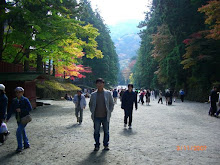 Just seeing the photo is enough to tell why the Thais want it and why we need to protect it. Below is the list of news, documents and links related to Preah Vihear:
Just seeing the photo is enough to tell why the Thais want it and why we need to protect it. Below is the list of news, documents and links related to Preah Vihear:Cambodia's proposal for the inscribtion of Preah Vihear on the World Hertiage List
http://www.pressocm.gov.kh/publishing/Preah%20Vihear_English.pdf
Prasat Preah Vihear overview: http://en.wikipedia.org/wiki/Prasat_Preah_Vihear
http://www.southeastasianarchaeology.com/2008/05/23/preah-vihear-an-overview/
Preah Vihear travel guide: http://wikitravel.org/en/Preah_Vihear
International Court of Justice: Case concerning the temple of Preah Vihear
http://www.icj-cij.org/docket/index.php?sum=284&code=ct&p1=3&p2=3&case=45&k=46&p3=5
Understanding Preah Vihear issue: http://www.mfa.go.th/internet/information/19648.pdf
Preah Vihear News: http://www.preahvihear.com/
Tale of Asia on Preah Vihear: http://www.talesofasia.com/cambodia-preahvihear.htm
Pilgrimage to PV: http://www.earthportals.com/Portal_Messenger/stonesinsky5.html
Gobal Voice on Preah Vihear (comments on Preah Vihear issue)
http://globalvoicesonline.org/2008/06/24/preah-vihear-belongs-to-cambodia/
Preah Vihear Photos: http://impressive.net/people/gerald/photos/by/location/cambodia/preah%20vihear
News links related to Preah Vihear dispute:
Thailand to co-host bid Preah Vihear listed by Unesco (a new trick)
http://www.bangkokpost.com/280608_News/28Jun2008_news10.php
Thai court nixes temple cooperation
http://ap.google.com/article/ALeqM5j_Jf2WvfwZyntywvbTXg0VfGEfwwD91J39TO0
Temple tenstion: Kenneth's letter to PP Post (why is Cambodia gov't so stupid)
http://www.phnompenhpost.com/index.php/200806268841/National-news/Temple-tensions.html
Ancient temple at center of debate in Thailand
http://ap.google.com/article/ALeqM5jZwfevhsGLvqW-M__bOJ1Psix7swD91HT2H00
The judgement of the World Court, 1962
http://www.bangkokpost.com/250608_News/25Jun2008_news20.php
Abishit: Gov't telling lies ( Leader of gouts)
http://www.bangkokpost.com/250608_News/25Jun2008_news01.php
Win-win temple deal (Cambodia was trapped in fact)
http://www.bangkokpost.com/220608_News/22Jun2008_news08.php
Preah Vihear white paper to be released
http://www.bangkokpost.com/210608_News/21Jun2008_news06.php
Thai rally over temple dispute
http://ap.google.com/article/ALeqM5gsN2uTPpxoebQhHlznf-JLCQyKvgD91CEF500
Dispute holds up temple listing
http://www.radioaustralia.net.au/programguide/stories/200806/s2273596.htm
Preserve the integrity of Preah Vihear ( a Thai scholar reveals some facts)
http://www.bangkokpost.com/290608_Perspective/29Jun2008_pers001.php
Commentary: Nationalistic puppets (why Thais think they are greatest race in SE)
http://www.bangkokpost.com/topstories/topstories.php?id=128521
Prasat Preah Vihear overview: http://en.wikipedia.org/wiki/Prasat_Preah_Vihear
http://www.southeastasianarchaeology.com/2008/05/23/preah-vihear-an-overview/
Preah Vihear travel guide: http://wikitravel.org/en/Preah_Vihear
International Court of Justice: Case concerning the temple of Preah Vihear
http://www.icj-cij.org/docket/index.php?sum=284&code=ct&p1=3&p2=3&case=45&k=46&p3=5
Understanding Preah Vihear issue: http://www.mfa.go.th/internet/information/19648.pdf
Preah Vihear News: http://www.preahvihear.com/
Tale of Asia on Preah Vihear: http://www.talesofasia.com/cambodia-preahvihear.htm
Pilgrimage to PV: http://www.earthportals.com/Portal_Messenger/stonesinsky5.html
Gobal Voice on Preah Vihear (comments on Preah Vihear issue)
http://globalvoicesonline.org/2008/06/24/preah-vihear-belongs-to-cambodia/
Preah Vihear Photos: http://impressive.net/people/gerald/photos/by/location/cambodia/preah%20vihear
News links related to Preah Vihear dispute:
Thailand to co-host bid Preah Vihear listed by Unesco (a new trick)
http://www.bangkokpost.com/280608_News/28Jun2008_news10.php
Thai court nixes temple cooperation
http://ap.google.com/article/ALeqM5j_Jf2WvfwZyntywvbTXg0VfGEfwwD91J39TO0
Temple tenstion: Kenneth's letter to PP Post (why is Cambodia gov't so stupid)
http://www.phnompenhpost.com/index.php/200806268841/National-news/Temple-tensions.html
Ancient temple at center of debate in Thailand
http://ap.google.com/article/ALeqM5jZwfevhsGLvqW-M__bOJ1Psix7swD91HT2H00
The judgement of the World Court, 1962
http://www.bangkokpost.com/250608_News/25Jun2008_news20.php
Abishit: Gov't telling lies ( Leader of gouts)
http://www.bangkokpost.com/250608_News/25Jun2008_news01.php
Win-win temple deal (Cambodia was trapped in fact)
http://www.bangkokpost.com/220608_News/22Jun2008_news08.php
Preah Vihear white paper to be released
http://www.bangkokpost.com/210608_News/21Jun2008_news06.php
Thai rally over temple dispute
http://ap.google.com/article/ALeqM5gsN2uTPpxoebQhHlznf-JLCQyKvgD91CEF500
Dispute holds up temple listing
http://www.radioaustralia.net.au/programguide/stories/200806/s2273596.htm
Preserve the integrity of Preah Vihear ( a Thai scholar reveals some facts)
http://www.bangkokpost.com/290608_Perspective/29Jun2008_pers001.php
Commentary: Nationalistic puppets (why Thais think they are greatest race in SE)
http://www.bangkokpost.com/topstories/topstories.php?id=128521
Preah Vihear listed as a world heritage
Temple issue helps pin Thai stance on colonial map (a big gain for Thais)http://www.nationmultimedia.com/2008/07/14/politics/politics_30078015.php
Thai-Cambodian border stand-off continues
http://www.nytimes.com/2008/07/21/world/asia/21cambodia.html?_r=1&partner=rssnyt&emc=rss&oref=slogin
Cambodia turns down Thai request to review the borderline
The reasons behind Thai-Cambodian temple dispute






